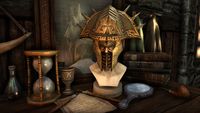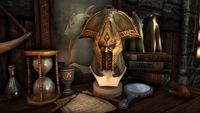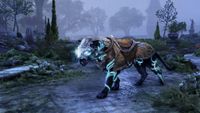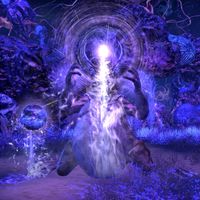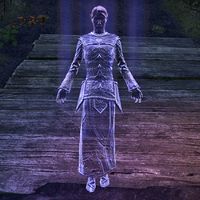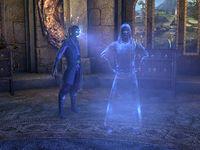Lore:Telepathy
Telepathy is a magical ability allowing individuals to establish a strong mental connection with others, enabling them to communicate over great distances through thought alone. There are some with a gift for the skill, though telepathy takes some practice to use.[UOL 1] Masters of this skill like the monks of the Psijic Order, the Dwemer, and the Sea Sloads are particularly good at it, and Morian Zenas and Seif-ij Hidja are a notable example of individuals who developed a mutual telepathic link.[1][2] Conjuration links the caster's mind with the summoned, forming a delicate connection primarily for control and dismissal, but in skilled hands, it can become more formidable.[1]
Practitioners[edit]
Daedra[edit]
The Daedric Princes are known to telepathically speak, sometimes to multiple people at once,[3] though this ability is limited to those near one of their shrines if they are weakened.[4]
Some other Daedra were known to employ tools like magical compasses to establish telepathic connections,[5] while others had the ability to communicate without such devices.[6]
Dwemer[edit]
The Dwemer were known practitioners of telepathy.[1] They had a mastery over Tonal architecture and were able to achieve this through technological means. The Dwemer had headgear known as Dwarven Miters,[7][8] which gave them the ability that was known as "The Calling", which seems to have been similar to telepathy.[9][10] It allowed the Dwemer to communicate with each other over great distances. Three known varieties of miters exist, with the master miter being worn by the "Tuathumz" or "central pylon" of their Thought Calling system. It contains three finials thought to be broadcast-foci.[11] The spiked miter has spikes believed they actually functioned as "etheric antenna," helping with long-distance Thought Calls.[12] The common visor miter lacks these features. It has been suggested that, in the last moments before they disappeared, Lord Kagrenac used The Calling to summon all of the Dwemer people and rally them to carry out his plans to transcend the Mortal Plane.[9]
Psijic Order[edit]
The Psijics are known practitioners of telepathy.[1] They are known to selectively breed Senches, selecting only the brightest among the litters to sire the next generation. Psijic monks who choose these creatures as companions often establish telepathic connections with them, valuing their remarkable conversational skills.[13]
Sload[edit]
The Sea Sload were known to use telepathy through mind magic.[2] They could connect to multiple minds at once, namely their yaghra minions. The magic appeared to operate in an area of effect, allowing anyone in the proper vicinity to hear the telepathic words.[14]
Third Empire[edit]
At the onset of the Invasion of Akavir, the Battlemage Corps of Imperial Legion maintained telepathic communication with Tamriel from across the Padomaic Ocean. However, Uriel Septim V's battlemages were subsequently plagued by magical interference by the Tsaesci and struggled to connect with their telepathic compatriots at the War College in Cyrodiil.[15] Members of the Mages Guild during the Imperial Simulacrum were known to confirm the completion of quests via telepathy.[16]
Other[edit]
Certain mages had the capability to establish direct contact with another person's mind. Spells like Psijic projection,[17][18][19] also known as aural projection,[20] were used for long-distance communication. Despite their name, these spells were not exclusive to the Psijic Order, even though they were named after them.[17][21][22] A (potentially fictional) group referred to as the Telepaths was rumored to have been employed by select City-State kings to delve into a person's mind and ascertain the veracity of their statements.[23]
Sending stones are mysterious devices that enable long-distance communication, and while their origins are unclear, some have been found in Aldmer crypts located in the Summerset Isles. They were employed by the Fighters Guild, and had Aldmeri and Psijic etchings.[24][25]
Several gods can reportedly communicate telepathically, such as Sithis,[26] Tu'whacca,[27] and Arkay.[28] Some godly artifacts, such as Totem of Tiber Septim and Meridia's Beacon, are capable of telepathy.[29][30]
The Listener of the Dark Brotherhood can hear the voice of the Night Mother, a figure of reverence whose physical form is only a corpse.[31][32]
Faolan, entombed in his resting place, was said to possess the ability to establish telepathic connections with those who wielded his blade, Red Eagle's Fury, in close proximity to his tomb.[33]
Golden Eye Guars exhibit remarkably rapid responses to commands, often likened to almost possessing a telepathic connection with their riders.[34]
Those whose souls are bound can communicate telepathically with whomever has the object they are bound to on their person.[35][36] Conversely, those who are bound can also hear those who possess their item.[37]
It is possible to use Shadow Magic to establish a telepathic connection. This is achieved by connecting the shadows of beings, enabling communication across vast distances. However, the procedure for doing so is accompanied by pain. Azra Nightwielder termed this phenomenon an "umbric connection."[38]
Telvanni Magisters often relied on the aid of Mouths, assistants who acted on their behalf. On certain occasions, Mouths also served as conduits for channeled projection of their masters, manifesting projections of their superiors originating from their mouths.[39]
Notes[edit]
- The Dreamsleeve transmission is a method of long-distance communication employed by magicians.[40] Some claim that it is utilized as a rapid means of magical communication, related to telepathy and "Memospores".[UOL 2][UOL 3][UOL 4]
References[edit]
- ^ a b c d The Doors of Oblivion — Seif-ij Hidja
- ^ a b The Elder Scrolls Online: Summerset Collector's Edition Strategy Guide — Garitt Rocha, David S.J Hodgson
- ^ Vigilant Tyranus' dialogue in Skyrim
- ^ Barbas' dialogue in Skyrim
- ^ Plokun's dialogue in ESO: Blackwood
- ^ From the Journal of Dranos Velador, Field Captain of the Silken Ring — Dranos Velador
- ^ Dwarven Visor Miter hat description in ESO
- ^ Neramo's dialogue in ESO: Greymoor
- ^ a b Chimarvamidium — Marobar Sul
- ^ The Doors of Oblivion — Seif-ij Hidja
- ^ Dwarven Master Miter hat description in ESO
- ^ Dwarven Spiked Miter hat description in ESO
- ^ Sagacious Psijic Senche's description in ESO
- ^ Indirim's Journal, Assembled — Indirim
- ^ Report: Disaster at Ionith — Lord Pottreid, Chairman
- ^ Events of Invasion from Oblivion in Daggerfall
- ^ a b Ealcil's dialogue in ESO
- ^ Indaenir's dialogue in ESO
- ^ Rurelion's dialogue in ESO
- ^ Ulliceta gra-Kogg's dialogue in ESO: Summerset
- ^ Seeks-the-Night's dialogue in ESO
- ^ Meln the Mouthless's dialogue in ESO: Necrom
- ^ Class Quizz in Morrowind
- ^ Khud af-Hadajja's dialogue in ESO: Blackwood
- ^ Morgane's Sending Stone item description in ESO: Blackwood
- ^ Antoinetta Marie's dialogue in Oblivion
- ^ Throne Keeper Farvad's dialogue in ESO
- ^ Florentius Baenius' dialogue in Skyrim: Dawnguard
- ^ The Totem of Tiber Septim's dialogue during the Totem, Totem, Who Gets the Totem? in Daggerfall
- ^ Meridia's Beacon in Skyrim
- ^ Cicero's dialogue in Skyrim
- ^ Night Mother's dialogue in Skyrim
- ^ The Red Curse — Dettethor Pantenne
- ^ Golden Eye Guar's Crown Store Showcase description in ESO
- ^ Meln the Mouthless' dialogue in ESO: Necrom
- ^ Soul of Dusk's dialogue in ESO: Imperial City
- ^ Nelacar's dialogue in Skyrim
- ^ Azra Nightwielder's dialogue in Shadowkey
- ^ Arith Sendrul and Magister Gothren's dialogue during The Magister Makes a Move in ESO: Morrowind
- ^ Loremaster's Archive: Murkmire Q&A — Jee-Lar
Note: The following references are considered to be unofficial sources. They are included to round off this article and may not be authoritative or conclusive.
|
||||||||||||||||||||||||||
